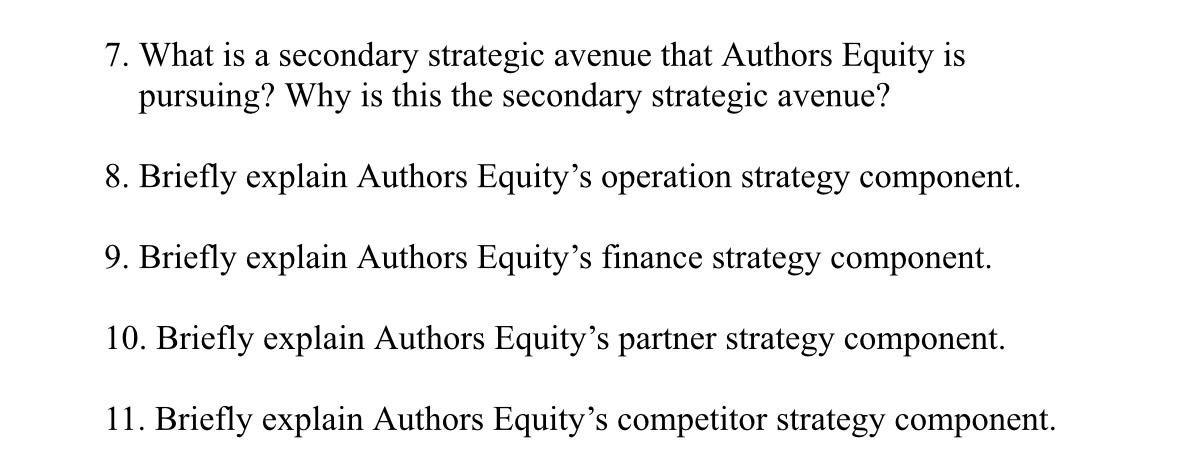Answered step by step
Verified Expert Solution
Question
1 Approved Answer
Exam 1 review material Superior performance and strategic components section Case Study: On March 5 th , 2 0 2 4 , Authors Equity, a
Exam review material
Superior performance and strategic components section
Case Study:
On March th Authors Equity, a new book publisher, began operations after being created by some of the biggest names in the publishing industry and receiving funding from recent successful authors. According to Elizabeth Harris of the New York Times, this "new house is small, with just six employees, but its founders hope that their experience and approach to publishing will attract writers." Harris continues,
Contrary to the usual practice, Authors Equity won't offer authors money upfront or guarantee them a payment but it will give them "the lion's share" of any profit that is made, according to Ms McIntosh.
As a financially conservative person, I would be very nervous asking people to invest in a new company that was dependent on beating other companies with the size of its checkbook," Ms McIntosh said. "I feel very confident about competing based on the experience that we can offer...."
In addition to offering authors a share of profits, Authors Equity will pay them monthly, instead of in advances that can be drawn out over years. Their books will be distributed by Simon & Schuster, where Ms McIntosh serves as a board member and which is one of the country's major publishers.
"It's nice to be rewarded for your performance, and to feel like the better you do the better it gets," said James Clear, author of the enormously successful book "Atomic Habits" and an investor in Authors Equity. "I would summarize where it fits in the landscape as: more profits than legacy publishing and better distribution than selfpublishing."
This is in contrast to the typical book publishing approach. Harris explains,
Traditionally, when authors sell their books to a publisher, they receive what's called an advance, which is a guaranteed payment. The money is usually paid out in thirds or quarters, generally when the deal is signed, when the final manuscript is accepted and when the book is published. An author will earn royalties on top of that only if the book sells above a certain threshold.
Many books, however, lose money. Publishers spread the risk they take on new books by publishing a number of titles in a given year and by supporting new books with the consistent revenue stream provided by successful older books. This structure is part of what makes it so difficult to start a new publishing house: There are no reliable older titles to support bets on new ones.
This type of financial arrangement with authors necessitated rethinking the typical book publishing process. Harris highlights these changes,
Ms McIntosh said that Authors Equity could offer more favorable terms than large houses, in part because it will have little overhead. The publishing team for each book, including editors, publicists and marketers, will be assembled from a growing pool of freelancers. Authors and their agents will help decide who gets hired.
Mr Weisberg and Ms McIntosh said that since the pandemic, many talented people have prioritized a better worklife balance with more flexibility, creating a robust world of freelancers.
"Today, something like what we're doing is more feasible than it would have been maybe five years ago," Mr Weisberg said. "You have the combination of the industry changing and the world changing that opens up the door."
While there are many positives about this new business model, Harris notes that there are critics,
Some in the industry expressed skepticism about the approach, noting that many writers can't afford to wait and hope that a book will succeed.
"It's putting the risk more on the author than the publisher," said Robert Gottlieb, a literary agent and chairman at Trident Media Group, which represents more than authors. "Most authors need the advance, and if that's taken out of the equation, the risk is enormous."
Other agents said that the book business is in desperate need of innovation.
To keep the business healthy for authors, we need to consider new models for how they are compensated and how books are published," said Christy Fletcher, a cohead of the publishing division for United Talent Agency.
While Authors Equity will offer another option in an industry that has seen tremendous consolidation in recent years, it is likely to remain fairly unique in the market. The industry star power and professional network of its principals will give the company access to authors and investors that another publisher going out on its own simply wouldn't have.
Its model also won't work for every author. Most need an upfront payment to live on while they write their books. But Ms McIntosh said that despite the risks, this model is not only for authors who already have devoted readers.
We love working with established authors, but we also get a real charge out of taking someone who is not known and making them known," Ms McIntosh said. "I look forward to talking to authors who are at lots of different stages of their career"

Step by Step Solution
There are 3 Steps involved in it
Step: 1

Get Instant Access to Expert-Tailored Solutions
See step-by-step solutions with expert insights and AI powered tools for academic success
Step: 2

Step: 3

Ace Your Homework with AI
Get the answers you need in no time with our AI-driven, step-by-step assistance
Get Started


